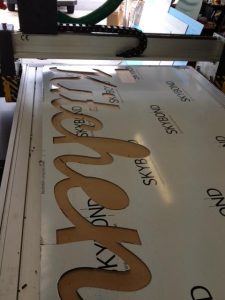Image Sign Studio design and manufacturer the highest quality shop signs here in their Sheffield workshop. They manufacture a huge range of type of shop signs & business signs to suit every business from high-street shops to warehouses – in fact They’re still to find a job they can’t do! However, it’s always useful to have a list of our their popular shop sign types – you never know when you’ll be in the market
Image Sign Studio’s Most Popular Business, Shop Signs, and Letter Types
- Fret cut signage – fret cut signage, also sometimes known as fret cut lettering or computer cut lettering, is where the letters and images are cut from a sheet of material usually using a CNC router or laser cutting machine
- Aluminium tray sign – aluminium tray signage is where the business or shop sign is cut from or attached to an aluminium tray. The fixings are usually hidden, and the sign stands proud from the wall
- Backlit sign – our signs can be easily backlit, usually using LEDs, to create a slick and modern looking sign. In other words, the sign is placed in front of a light-source. The light can either create a ‘floating’ effect or can shine through translucent areas to make the sign more visible at night.
- Fret cut illuminated signs – fret cut illuminated signs are often made from aluminium panels. They often comprise of front and back trays which can be any colour and usually used when illumination is required. Great to create a lit 3D effect
- Acrylic letters, flat cut letters, sign letters, acrylic cut out letters and aluminium letters – these letter types are created in our workshop and used for many purposes including in conjunction with the other types of signs
- Perspex letters signage – letters cut in our workshop usually using a CNC router are used to create this popular and cost-effective signage. Good for back-lit or internally lit signage such as aluminium composite tray or aluminium tray sign
- CNC signs – CNC signs are cut from material using a CNC router which is computer controlled. As such, these signs can be intricate and use images as well as standard letters
- Light box sign – a lightbox sign is a type of illuminated sign using a frame and lighting source
- Directional signage – this type of signage is used everywhere from shops and warehouses to schools and hospitals. It’s designed to be practical and clear giving people instructions and showing the way
- Sign tray – a sign tray is used very commonly in shop signs and business signage and can be made from a wide range of materials. Often backlit or internally lit, this type of sign is a very popular choice for many businesses
- Aluminium composite sign tray – similar to the aluminium tray sign, this sign is made from composite material and can be used for many purposes
- Dibond signs – dibond signs are most commonly used when strength is an important factor. These signs provide resistance to physical impact and heat and are most commonly used for shop signs, wall signs, information and directional signage.
Find Out More About Our Different Types of Business Signage and Shop Signs
Get in touch with image Sign Studio today through their contact page or call them directly on 0114 261 7617 for more information on their range of shop signs, business signage and manufacturing workshop

